Newborn & Infant Custody Schedules: Tips, Considerations, Examples, & Templates
Becoming a parent means making many decisions. For separated parents, this includes creating an infant custody schedule. Get expert advice, download free templates, and explore the pros and cons of different schedules in this guide.
Inside this article
- Factors in choosing a parenting schedule for infants, newborns, and babies
- Different options for sharing infant parenting time
- Shared custody schedules for infants and examples of progressive parenting sche…
- Common misconceptions about infant custody schedules
- Easiest way to make and manage infant custody schedules
What is the Difference Between Infant vs. Baby vs. Newborn?
"Infant," "baby," and "newborn" all refer to very young children. Some sources define newborns as up to one month old, infants from one month to one year, and babies from birth to two or three years old. For infant parenting plans, factors like breastfeeding matter more than the exact age.
Experts and parents often use the terms interchangeably, and there is no strict definition for each term. This article uses the term “infant” for consistency, but this information can apply to a newborn, baby, or infant.
No matter what you call your child — newborn, infant, or baby — the key to a successful infant parenting plan is addressing your infant’s unique developmental needs, minimizing conflict, and involving both co-parents. This means supporting biological needs like breastfeeding, creating a consistent routine, and fos tering an environment where the infant bonds with both parents.
tering an environment where the infant bonds with both parents.
“Parenting plans for infants are some of the most challenging ones to create because there are so many factors to consider,” says Stefanie Peachey, Registered Social Worker and Accredited Family Mediator, owner and director of Peachey Counselling and Family Support in Ontario. “While the needs of an infant are relatively basic, they’re absolutely critical and set the foundation for their future mental and physical health.”
Key Takeaways:
- Crafting an infant custody schedule requires prioritizing developmental needs like breastfeeding, consistency, and time with both parents.
- Consider the mother’s mental and physical health when setting up the plan.
- Key factors include breastfeeding needs, work schedules, the infant’s need for stability, and frequent, meaningful interactions with both parents.
- Many co-parents use a progressive plan, where the mother has all the overnights and the co-parent gradually increases their parenting time as the infant ages.
- Contrary to misconceptions, infants can form secure attachments with both parents, are affected by co-parent conflict, and benefit from consistent, frequent interactions with both co-parents.
- A co-parenting app can help reduce conflict, share memories, and manage a flexible, adaptable schedule.
How Do Infant Custody Schedules Work?
Co-parents can choose one of two custody schedule types. The first is a shared parenting plan with fixed overnights. The second is a progressive plan where one co-parent gradually gets more overnights. The choice depends on breastfeeding, the mother’s health, and each parent’s comfort with infant care.
Here's an overview of how custody type works for infants:
- Conventional Shared Parenting Schedules:
This method divides parenting time according to a standard shared parenting schedule, such as 50/50 custody schedule or 60/40 custody schedule, from the beginning. While this approach is common for co-parents with older children, most experts advise against starting with overnight stays for both parents until the infant reaches certain developmental milestones, such as weaning. - Progressive Parenting Plan (also called “step-up parenting plan” or “dynamic parenting plan”):
In a progressive parenting plan, one parent has most of the parenting time. When it comes to infants, usually the mother starts with most of the overnights because of the unique needs both mother and baby have following pregnancy and childbirth. Then, the non-custodial parent drops in for visits during the day. Over time, the non-custodial parent gets more overnights until they reach the long-term schedule that both parents agree with, like a 50/50.
Many co-parents choose the progressive plan for infants because a standard shared schedule isn’t possible due to the child’s specific needs. For example, breastfeeding infants need frequent time with the mother. The progressive plan allows the infant to stay with the breastfeeding parent initially, while gradually increasing the other parent’s overnights as the child grows and both parents adapt.
What to Consider When Choosing an Infant Custody Schedule
The first factors in infant custody schedules are whether the infant is breastfeeding and whether the mother can store breast milk. Other factors include the mother’s physical and mental health, the amount of parental leave each parent has, and each parent's confidence in infant care.
care.
“The first questions we ask are whether mom is breastfeeding and if she can pump milk,” says family law attorney Elyse Victor. “If she can pump, it allows the other co-parent to have longer parenting time since they can use stored milk to feed the baby. If she is breastfeeding, the other co-parent will need to have shorter visits to meet the baby’s needs and the mother’s needs.”
Paola Beçi, Barrister and Solicitor, BFA, MIR, JD, GDLP, emphasizes the importance of the mother’s health and mental well-being. Beçi is a dual-jurisdiction lawyer in Canada and Australia and a Partner at ALF LLP, representing clients in litigation and international family law in the Toronto area.
“One of my top priorities is reducing the mother’s stress and increasing her joy,” she says. “Any stress or conflict the mother experiences will always trickle down to the infant.”
Here's a summary of the deciding factors for creating a custody schedule for infants:
- Breastfeeding: Is the child breastfeeding? If so, can the mother pump and store milk?
Infants who are breastfeeding generally need to be with their mother most of the time, as they typically need to breastfeed every two to three hours, usually for at least six months. A parenting plan for a breastfeeding infant should allow the mother to have all of the overnights. While some mothers can pump milk for the other parent, this isn’t an option for everyone. Both parents should communicate openly about this possibility, ideally with guidance from a doctor and child development expert.
If the infant is on formula, balancing overnights is easier. However, experts recommend exclusive breastfeeding for the first six months whenever possible. Health institutions stress that breastfeeding has numerous benefits for the baby and the mother. Co-parents should prioritize the child's needs over convenience when creating the schedule.
“Breastfeeding provides essential nutrients and antibodies that are crucial for the infant's health and development, and the mother and baby need frequent feeding sessions to maintain the mother’s milk supply,” Beçi says.
She adds that having a parenting schedule that pulls a breastfeeding mother away from her baby overnight can be harmful. “For some mothers, being unable to breastfeed because their infant is not with them can be unbearable and can have a detrimental effect on the mother's physical and mental health, including breast milk loss and losing the ability to breastfeed altogether. There is absolutely no reason to overlook this crucial fact in both mother and child.” - Mother’s mental health: Is the mother experiencing any type of conflict, stress, or postpartum depression?
The priority of any custody decision is meeting the best interest of the child. For infants, this also includes the mother’s mental health. Research shows that there is a direct link between a mother’s stress levels and the outcomes for her infant, both during and after pregnancy.
Beçi explains the practical implications for parenting plans: “Infants thrive on consistency and predictability, and introducing prolonged separations from the mother too early can disrupt these essential routines or lead to stress and anxiety in the mother, which may impact the infant’s development and overall well-being.”
Peachey echoes these sentiments. “We can't ignore the toll pregnancy and birth take on a mother's health,” she says. “We've normalized giving birth but don't discuss how stressful and traumatic it can be, even when everything goes right. The other co-parent must be mindful that the mother needs time to recover physically and mentally. This awareness benefits the mother and is crucial for the baby's well-being. A mother's health directly impacts her ability to care for her child effectively. If she's struggling and doesn't get support, the baby might absorb her stress." - Co-parenting dynamic: Do the co-parents experience high conflict and argue often?
A robust body of research shows that conflict harms an infant’s emotional and mental development. Co-parents in conflict-prone situations should be honest and take steps to minimize conflict, especially in front of the infant. - Parental leave and work schedules: Do both parents have time off work to dedicate to childcare?
In the United States, there is no federal law guaranteeing parental leave for either mothers or fathers. Many employers offer some form of parental leave, but it often favors mothers more than fathers. On average, companies provide mothers with 29 days of leave and fathers with only 17 days. In contrast, countries like Canada offer both parents a significant amount of federally funded time off, with additional leave potentially provided by private employers.
Regardless of the country, co-parents need to assess how much paid time off they have. In the U.S., the disparity in parental leave can lead to situations where mothers have more time off and energy to care for the infant, while non-custodial parents may have less time and energy for nighttime feedings and other childcare responsibilities. Additionally, taking unpaid time off can be beneficial but may also lead to financial stress, which can indirectly affect the infant’s well-being. - Secure attachment considerations: Does the parenting plan give the infant enough time with each co-parent to bond?
During the first few years, babies form the foundations of their emotional connections with their parents and caregivers. Attachment theory explores the different child attachment styles and how these early bonds affect future relationships and mental health. Secure attachments mean that a child feels safe, loved, and confident around their parents. Some evidence suggests that children with secure attachments to both parents may have more positive future relationships and better mental well-being in adulthood.
Peachey emphasizes that frequent, consistent interactions are a must for an infant to form a secure attachment with both parents. “I can’t stress enough that the visits need to be consistent. Infants don’t form core memories, so once the non-custodial co-parent leaves, the infant won’t necessarily understand that they are coming back.” - Parent confidence: Is the non-custodial co-parent confident caring for an infant alone?
“Another important factor is each co-parent’s comfort with caring for an infant alone,” says Victor. “Sometimes, one parent might feel nervous or less confident about being alone with a baby. This worry often comes from wanting to provide the best care. Both co-parents should think about how the child reacts to time alone with each parent and whether a gradual parenting plan might work better.” - Consistency: How can you provide a consistent schedule and place for your infant?
Consistency in routine and environment is important for infants. Stability helps them feel secure and builds trust with their caregivers.
“I strongly recommend a consistent schedule and stable environment for infants, especially those under six months old,” Peachey says. “Moving a child out and about, from home to home, can be stressful on several levels. They are incredibly vulnerable and completely dependent emotionally and physically. Being sensitive to this need might mean that one co-parent must sacrifice their overnights until the baby is ready.” - Geographic distance: How far do the co-parents live from one another?
Co-parents who live close together can easily arrange frequent exchanges. However, those living more than an hour apart might struggle to stay connected and keep a regular schedule, which can be challenging for both the parents and the child.
Long commutes can be tough on parents and stressful for young children. Whenever possible, co-parents should reduce the travel time for the child. - Other caregivers: Do one or both co-parents have childcare support from extended family?
“Some parents benefit from an extended family that offers strong support,” Victor says. “Grandparents, uncles, cousins, and others can step in to give co-parents a break, especially if both are working. For example, if one co-parent has less time off work, a grandparent can watch the child while the co-parenting is working. This extra support allows the co-parent to spend more quality time with their child when they do return, which they might not have been able to do without the grandparent’s help.”
How Do State Laws Vary on Newborn and Infant Custody?
States have different laws and considerations to guide parenting decisions, including how to make infant parenting plans. Some states may consider different factors when deciding what’s in the child’s best interests. Others have a 50/50 presumption that may affect the parenting schedule.
It’s helpful if co-parents can come to a parenting plan schedule outside of court with the aid of attorneys or mediators. However, when the co-parents can’t come to an agreement alone or with a mediator, they may have to present their cases in court for a judge to decide on a parenting schedule. Usually, the court looks at each parent’s case and makes custody court orders that they believe are in the child’s best interest.
Different states and jurisdictions have different statutes guiding this and other infant custody processes.
Here’s a list of ways that states differ in considering newborn and infant custody:
- Child’s “best interest” factors
When determining custody, judges consider the child’s best interest. This legal standard involves evaluating various factors to decide what arrangement will most benefit the child.
Most states assess similar factors for an infant's parenting schedule. These include the breastfeeding schedule, parental leave, parenting experience, and additional considerations like each parent's fitness and geographic distance.
Victor gives an example from Michigan: “A judge looks at 12 factors to decide what is best for the child. These factors include the parents’ mental and physical fitness, capacity or disposition to provide for the child, and the stability of the child’s living environment.”
While states may define their best-interest factors differently in their specific statutes, they generally consider similar broader concerns. In any state, judges have significant discretion and authority to use court orders to make custody decisions. - Custody presumptions
An increasing number of states have modified their laws to include a presumption that equal time with both parents is best for a child. In these states, unless the co-parents can prove that the schedule isn’t in the child’s best interest, the court will order a 50/50 split. Some states with a 50/50 presumption include Georgia, Missouri, Oregon, and Virginia.
In the case of infants, co-parents can certainly bring up considerations like breastfeeding or a work schedule to argue that a 50/50 plan isn’t feasible yet. - Terminology
Many states use different terminology when discussing identical co-parenting or family law concepts. For example, some states still use the term “custody schedule,” though many favor the term “parenting time” or “visitation” to describe the specific schedule that a parent spends with a child. No states have a specific definition of terms like “newborn,” “infant,” or “baby,” and most use them interchangeably.

Infant Custody Schedule: Overnight Examples
Shared infant overnight custody schedules are appropriate only for infants not breastfeeding and at least six months old. In that case, experts strongly recommend custody schedules that ensure the infant sees both parents frequently, like a 2-2-3 custody schedule.
Most co-parenting experts agree that younger children need frequent visits with both parents to form secure attachments. At the same time, infants need stability and routine, and mothers may struggle with being apart from their babies due to postpartum recovery. Considering these factors, experts often recommend that, for at least the first six months, one co-parent, usually the mother, has all of the overnights.
“I advise against overnight access until the infant is weaned from breastfeeding or the first year of the infant’s life, regardless of how strong the co-parenting relationship is,” Beci says.
Beci acknowledges that this reality can be difficult for the other co-parent.
“In the early stages of parenthood, fathers often face a profound fear: the worry that if they do not establish significant parenting time immediately, they may never get the chance,” Beci says. “This fear, while understandable, can ultimately be detrimental to the infant, the mother, and the co-parenting relationship. One of my priorities when creating an infant parenting plan is to reduce this fear by using a forward-thinking approach and stressing that, with time, we will explore overnights and shared schedules.”
Specific situations will vary, so it's important to consult with a doctor and co-parenting expert.
When the infant and co-parents are ready for shared overnights, here are some possible schedules and considerations to keep in mind:
- Overnight infant custody schedule considerations
“I wouldn’t put a young child away from their primary caregiver for more than three nights,” Peachey advises. “Especially infants, who don’t have object permanence and won’t understand that mom or dad still exists out in the world after they leave.”
It's important to note that most co-parenting experts don’t recommend any schedule with the infant alone for more than three nights. However, some parenting schedules can accommodate extenuating work circumstances or other life issues that may force a parent to be away for more than a few nights.
- Overnight schedule examples
- 2-2-3 custody schedule
Works for: Infants who are not breastfeeding, infants six months and older, and co-parents who live close together.
Under a 2-2-3 parenting schedule, one co-parent has the infant for two days, and the other co-parent has the infant for the next two days. They finish at the first co-parent’s house for the last three days. The order switches next week.
Peachey says a 2-2-3 schedule is a good option for some infants. “A 2-2-3 schedule may be an option once a child is nearing the age of one,” she says. “By then, they have likely formed secure attachments with each of their parents, can eat a variety of foods, and probably can take a bottle. Also, they may have established routines.
- 2-2-3 custody schedule
- Alternating 2-day custody schedules
Works for: Infants who are not breastfeeding, infants six months and older, and co-parents who live close together.
In an alternating 2-day parenting schedule, the infant spends two days with one co-parent and two days with the other. This cycle continues throughout the week. This schedule isn’t very common because it is similar to the 2-2-3. But it’s an option for co-parents who think three nights apart from one parent is too much.
- 3-4-4-3 custody schedules
Works for: Co-parents whose schedules can’t accommodate a 2-2-3. However, experts generally don’t recommend this parenting schedule for infants.
In a 3-4-4-3 custody schedule rotation, the infant spends three days with one co-parent and then four days with the other. The order then switches: The infant spends four days with the first co-parent and three with the other.
The 3-4-4-3 schedule doesn’t keep the infant away from either co-parent for more than three nights and has only one exchange day a week. It’s ideal for co-parents who can’t handle the frequent logistics of the 2-2-3 but still want to ensure both parents have frequent and consistent time with the infant.
- 5-2 custody schedule
Works for: Co-parents who live far away or have extenuating work commitments. However, experts generally don’t recommend it for infants.
The 5-2 schedule is a type of 70/30 custody schedule, where one co-parent has 70% of the parenting time, and the other has the remaining 30%. In a 5-2 schedule, the infant spends five days with one co-parent and two days with the other. Many co-parents use this schedule so that the custodial parent has the weeks, and the non-custodial parent has the weekends.
Co-parenting experts generally don’t recommend this schedule for infants because it keeps them away from one parent for an extended period. However, it is an option for families where one parent has significant constraints because of distance or work commitments. If possible, add midweek visits to this schedule to give the infant more time with the non-custodial parent.
- Assigned weekend custody schedule
Works for: Co-parents who live far away or have to work long or irregular hours during the week. However, experts generally don’t recommend it for infants or very young children.
Assigned weekend parenting schedules allow co-parents to predetermine their child custody schedule for the entire month. Typically, the non-custodial co-parent picks a few weekends each month, like the first, third, and fifth. This arrangement often results in an 80/20 split, providing limited time for the non-custodial co-parent and potentially disrupting the infant’s routine and causing stress.
However, it might be the only viable option for non-custodial co-parents who live far away or have demanding work schedules during the week. If possible, add midweek visits to this schedule to give the infant more time with the non-custodial co-parent.
Pros and Cons of Infant Custody Schedules (not breastfeeding and at least six months old)
How to Create a Progressive Parenting Plan for Newborns and Breastfeeding Infants
In a progressive parenting plan, one parent, usually the mother, starts with all the overnights, and the other parent visits frequently. The plan gradually increases the non-custodial parent’s time as the baby grows. The plan’s specifics depend on the co-parents’ specific situation.
Almost all experts recommend some version of a progressive parenting plan in the early stages of an infant’s life. “A progressive plan is a more collaborative approach,” Beçi says. Under this approach, the parents focus on the baby’s immediate needs and gradually adjust the parenting schedule as the child grows. This approach is better for the baby and can foster a healthier co-parenting dynamic.
“To start, the infant stays with the mother, the person who gave birth, for at least three to six months – even if the baby is on formula,” says Peachey. “It’s natural that they are more immediately attached to the person who just brought them into the world. That means doubling down our focus on making sure that the other co-parent sees and interacts with the child frequently – which usually means that the other co-parent comes to the mother’s home for substantial periods of time.”
There are no standard progressive parenting plans. Instead, the plan balances the infant’s needs with each co-parent's constraints, and co-parents must remain cooperative as they manage the plan while the child grows and the parents adapt.
Here’s a summary of how a progressive parenting plan works:
- Start with a few daytime visits per week by the non-custodial co-parent
The amount of time and frequency of the visits depends on your unique situation. Beçi says that if the co-parenting dynamic is healthy and safe, and the mother is not experiencing additional stress, the non-custodial co-parent can see the infant as often as twice a day for parenting activities.
Peachey emphasizes that the non-custodial co-parent must be an active parent.
“It’s about spending time as a co-parent, not as a guest or a visitor. The co-parent should be hands-on, changing diapers, going through bedtime routines, having skin-to-skin contact, giving the mother some downtime, and overall gaining confidence as a parent.” - Gradually increase the amount of time the infant is with the non-custodial parent
“We time changes in the parenting plan to match big changes in the baby’s routine,” Victor says. “The feeding schedule usually determines these changes. For example, once the baby stops breastfeeding and starts eating baby food, the other co-parent may be able to exercise more parenting time. The exact steps depend on the co-parents’ specific situation.”
Beçi also advises co-parents to consider the infant’s nighttime routine. “For example, if an infant usually co-sleeps with the mother and then must transition to overnights with the father, the infant will likely struggle to adjust without the mother. I usually encourage the co-parents to have early conversations about how they will establish a healthy sleep routine for their infant.” - Mindfully transition to a fixed schedule:
The goal is to finish with a fixed schedule like 2-2-3, 3-4-4-3, or whatever split you agree on. Co-parents should consider how they will ease everyone into that new plan rather than abruptly changing it once the child reaches a certain age or developmental milestone.
“When moving to an overnight visit at the other co-parent’s house, it’s important for the co-parents to discuss everyone’s readiness,” advises Peachey. “Is the mom ready for time away from the child? Is the other co-parent ready to care for an infant alone? Is the child ready to be away? And are the co-parents prepared for ongoing communication around the child’s needs?”
Common Misconceptions about Infant and Newborn Custody Schedules
A misconception is that an infant can bond securely with only one parent. Another myth is that postpartum anxiety is rare in mothers. It's also false that infants are unaffected by parental conflict. Additionally, dual-parent involvement can still support a consistent routine.
Here are common misconceptions that could negatively affect how co-parents create an infant parenting schedule:
- Myth 1: Primary attachment to a single caregiver is the most important factor to consider.
Attachment theory explains how young children develop emotional bonds with their caregivers. Initially, experts believed infants could form secure attachments with only one caregiver, typically the mother. They recommended prioritizing this caregiver in parenting plans until the child could handle longer separations.
However, recent research presents a different view. One key study was titled “Should Infants and Toddlers Have Frequent Overnight Parenting Time with Fathers? The Policy Debate and New Data.” It found that children who regularly interact with both parents can form secure attachments with each. The 2017 study, published in Psychology, Public Policy, and Law, showed that adults who had equal overnight time with both parents as children often reported stronger relationships with both parents and better mental health.
While it’s difficult to study how overnight stays affect relationships empirically, experts agree that equal and regular involvement from both parents is best. The implication is that co-parents should be involved in the child’s life as soon as possible.
Additionally, research suggests that attachment should not be the sole factor determining custody schedules. A 2012 review, “Attachment in Child Custody: An Additive Factor, Not a Determinative One,” published in Family Law Quarterly, addresses the idea that courts often prioritize ensuring that a child can form a primary attachment when making custody decisions. The authors argue that a child’s secure attachment to their caregivers is just one of many factors that influence how they adjust to divorce. - Myth 2: The need for consistency is at odds with dual-parent involvement.
Experts agree that infants need consistency to thrive, but some plans prioritize this need at the expense of dual-parent involvement. These plans may limit non-custodial parents to brief midday visits, restricting the variety of interactions they can have with their infants.
However, experts recommend that both co-parents start interacting with infants in various contexts as soon as possible. Parents who handle feeding, diapering, and bedtime can better understand their children's habits, anticipate their needs, and form strong bonds. This relationship, developed during infancy, supports a loving and healthy bond throughout the child's life.
Peachey suggests non-custodial parents visit at different times of the day and involve themselves in all aspects of parenting. “If work allows, try coming around at different times to experience different aspects of childcare. Don’t just limit yourself to that sweet spot at noon. Come during the witching hours in the evening when babies get fussy. Or see if you can handle the 11 p.m. to 1 a.m. shift. You’ll value all that experience, and it will help you build confidence as a parent.” - Myth 3: Infants aren’t affected by co-parent conflict.
According to Peachey, there’s a damaging misconception that just because infants can’t understand language, they won’t absorb any conflict. “We know from ongoing research that the younger the child is, the more impactful conflict may be on their developing brain,” she explains. “It’s incredibly important for co-parents, especially those in high-conflict situations, to understand that when they’re both stressed or arguing in front of their infant, they will detrimentally affect them.”
She recommends that co-parents take extra measures to protect their infant from any conflict. "Parents in high-conflict situations need to make a huge effort to avoid conflict," she says. "This requires honesty and open communication. For example, if you were up all night with the baby and know you might be prone to conflict, consider asking to reschedule your time with the other co-parent. If you need help and support, ask your co-parent to come earlier or more often." - Myth 4: Postpartum anxiety or depression is uncommon and reflects poorly on a mother's parenting ability.
Unfortunately, a negative stigma still surrounds mothers who experience mental struggles after giving birth. In some cases, this stigma leads to reducing the time a mother spends with her child, which can be detrimental to both the mother and the infant. Additionally, there is a misconception that postpartum anxiety is rare, although it actually affects up to one in three women.
Beçi stresses that experts, such as doctors and mental health professionals, need to openly discuss postpartum anxiety as a natural part of childbirth.
“Immediately after giving birth, mothers undergo significant physical and emotional recovery, and nearly all experience changes in mental health, such as anxiety, baby blues, or postpartum depression,” she says. “Lack of support or judgment often worsens these issues. While postpartum physical symptoms are widely accepted, mental health symptoms remain taboo.”
Easiest Way to Make and Manage Infant Custody Schedules
An effective infant parenting schedule balances the child’s need for consistency, frequent contact with both parents, and flexibility. Communication between co-parents can encourage teamwork in caring for the child and upholding their best interest.
With OurFamilyWizard’s Calendar feature, co-parents can easily visualize their infant child’s schedule of overnights. It also helps both parents stay on top of events, like doctor’s visits. Even if only one parent attends, knowing that appointments are taking place can help the other parent feel more involved.
In addition, parents can use the Journal feature to share memories and special moments as their child grows. No one wants to miss out on precious moments of infancy, so using the Journal helps ensure everyone feels connected and can share early life milestones.
OurFamilyWizard gives parents a secure place to communicate that’s separate from their other text messages and emails. The app is their go-to place for all things co-parenting, helping them enter conversations with more focus. This can help reduce the stress that a child might absorb by overhearing something or reading a message they shouldn’t have seen.
Keep your entire family connected and thriving by starting your co-parenting journey with OurFamilyWizard on your side.








